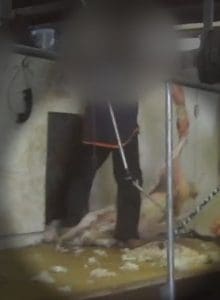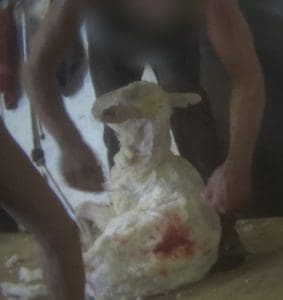
A shorn sheep being handled roughly. Picture – PETA Asia.
ANIMAL rights group PETA has released new footage of alleged sheep cruelty incidents in wool sheds to initiate investigations by authorities in New South Wales and Victoria.
The new PETA footage released yesterday allegedly shows shearers or shed hands punching sheep in the face, stamping and standing on their heads and necks, and beating and jabbing the animals in the face with electric shearing handpieces.
It also documents wounds on sheep allegedly being left untended and shearers stitching cuts using a needle and thread, supposedly without administering any pain relief.
Sheep Central has been told the incidents are believed to involve shearers and shed hands employed by at least one New South Wales-based contractor working in February-March this year. The new footage has sparked calls for greater vigilance among shearing contractors and shearers, and consideration of making pain relief mandatory for in-shed attention to shearing cuts.
PETA released the further footage just three years after a video expose that led to several shearers being charged and fined in Victoria,. Earlier this year, several shearers were fined up to $3500 and banned from owning or being in charge of a sheep for 1-2 years after pleading to various animal cruelty charges ion the Horsham Magistrates Court.
PETA said the new footage highlighted just some of the cruelty observed at each of the four shearing sheds visited by an eyewitness in New South Wales and Victoria, Australia’s top wool-producing states.
Video evidence passed onto Victorian and NSW authorities
PETA spokesperson Laura Weyman-Jones said the video footage and other details had been passed onto the RSPCA in New South Wales and Agriculture Victoria.
“I don’t know whether it is a case of (shearers) not listening or the whole industry is inherently cruel.
“It’s an industry that puts the profits of the industry before the welfare of animals,” she said.
“I think the general message here is that there is no way to produce humane wool.
“We just need to be looking into ways of producing and creating different fabrics that are cruelty-free animal-free fabrics.”
PETA said despite the convictions of shearers on charges of cruelty to animals, the most recent PETA exposé showed nothing has changed.
“Sheep are gentle animals who are petrified of even being held down, yet these sheep were punched in the face, kicked and stamped on, and had their heads slammed into the floor by unsupervised, impatient shearers, causing the sheep great distress and injury,” PETA founder Ingrid Newkirk said.
“PETA is calling on shoppers around the world to reject cruelty to animals – and that means never buying wool.”
Need for continuing education

A shearer stitches a cut. Picture – PETA Asia.
Shearing Contractors Association of Australia secretary Jason Letchford said the full force of the law should be used to investigate and prosecute if necessary cases of animal cruelty. The incidents showed a need for continued education and reinforcement of basic animal welfare values.
“It is showing that we need to keep refreshing our campaigns to prevent this happening, continue education and awareness to the industry’s workforce and reinforce the fact that consumers will not tolerate this unacceptable behaviour.”
Mr Letchford said consideration also needed to be given to the mandatory use of pain relief products such as Tri-Solfen prior to stitching shearing cuts.
“Tri-Solfen is not officially approved for use for shearing cuts and we need to address that along with education.”
Tri-Solfen is currently approved for use when mulesing, castrating and tail docking sheep in Australia, without veterinary prescription or supervision.
Hamilton veterinarian Andrew Whale said a vet can provide a prescription for use of Tri-Solfen for shearing cuts or other wounds in Victoria.
“This off label use does not have to be under direct supervision but legally requires a prescription for its use.”
But he said the laws around off-label Tri-Solfen use were different.
Animal cruelty condemned by WoolProducers
WoolProducers Australia chief executive officer Jo Hall said animal welfare is a key priority for the wool industry and is taken very seriously.
“WoolProducers strongly condemns animal cruelty and anybody found committing these offences has no place in the wool industry, as they are jeopardising the reputation of the vast majority of wool growers and shearers who treat animals humanely and with care on a daily basis.”
She said shearing is an extremely difficult job, but it is done so across the country in varying conditions at least five days a week and there is never a need for cruelty to be inflicted on an animal.
“WoolProducers is of the firm belief that offenders of animal cruelty should face the full force of the law – we do not want them in our industry.”
Photographs from the investigation are available here. Broadcast-quality video footage is available here.
Australian Wool Innovation did not respond to a request for comment on the new footage before this article was published.



HAVE YOUR SAY